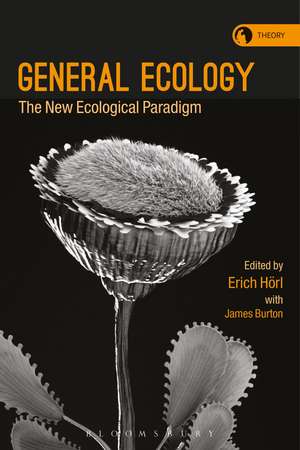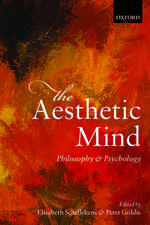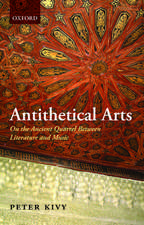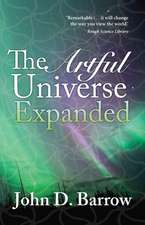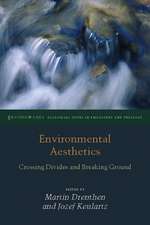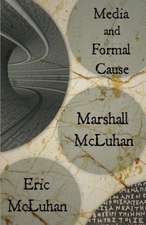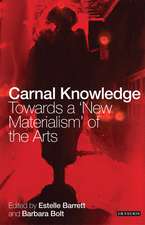General Ecology: The New Ecological Paradigm: Theory in the New Humanities
Editat de Erich Hörl James Edward Burtonen Limba Engleză Paperback – 3 mai 2017
| Toate formatele și edițiile | Preț | Express |
|---|---|---|
| Paperback (1) | 196.29 lei 6-8 săpt. | +55.23 lei 4-10 zile |
| Bloomsbury Publishing – 3 mai 2017 | 196.29 lei 6-8 săpt. | +55.23 lei 4-10 zile |
| Hardback (1) | 602.50 lei 6-8 săpt. | |
| Bloomsbury Publishing – 3 mai 2017 | 602.50 lei 6-8 săpt. |
Preț: 196.29 lei
Preț vechi: 225.59 lei
-13% Nou
Puncte Express: 294
Preț estimativ în valută:
37.57€ • 40.83$ • 31.58£
37.57€ • 40.83$ • 31.58£
Carte tipărită la comandă
Livrare economică 21 aprilie-05 mai
Livrare express 14-20 martie pentru 65.22 lei
Preluare comenzi: 021 569.72.76
Specificații
ISBN-13: 9781350014695
ISBN-10: 1350014699
Pagini: 400
Dimensiuni: 156 x 234 x 34 mm
Greutate: 0.59 kg
Editura: Bloomsbury Publishing
Colecția Bloomsbury Academic
Seria Theory in the New Humanities
Locul publicării:London, United Kingdom
ISBN-10: 1350014699
Pagini: 400
Dimensiuni: 156 x 234 x 34 mm
Greutate: 0.59 kg
Editura: Bloomsbury Publishing
Colecția Bloomsbury Academic
Seria Theory in the New Humanities
Locul publicării:London, United Kingdom
Caracteristici
This is a very coherent, closely cross-referenced set of writings which actively dialogue with each other and attempt to provide an ecological paradigm to live by
Notă biografică
Erich Hörl is a philosopher and cultural theorist. He is professor of Media Culture at the Institute of Culture and Aesthetics of Digital Media (ICAM) at Leuphana University of Lüneburg, Germany.James Burton is a lecturer in Cultural Studies and Cultural History at Goldsmiths, University of London. He is the author of The Philosophy of Science Fiction (Bloomsbury, 2015).
Cuprins
AcknowledgmentsIntroduction to General Ecology: the Ecologization of Thinking (Erich Hörl, Professor of Media Culture, Leuphana University of Lüneburg, Germany)1. Computational Logic and Ecological Rationality (Luciana Parisi, Reader in Cultural Theory, Goldsmith's, University of London, UK)2. Elements for an Ecology of Separation: Beyond Ecological Constructivism (Frédéric Neyrat, a French philosopher and Assistant professor in Comparative Literature at University of Wisconsin-Madison, USA)3. General Ecology, Economy, and Organology (Bernard Stiegler, a French philosopher. He is head of the Institut de recherche et d'innovation (IRI), which he founded in 2006 at the Centre Georges-Pompidou, France)4. Critique of the Cosmology of the Moderns (Didier Debaise, Professor of Philosophy, ULB, Brussels, Belgium)5. Deep Times and Media Mines: A Descent into Ecological Materiality of Technology (Jussi Parikka, media theorist, writer and Professor in Technological Culture & Aesthetics at Winchester School of Art, University of Southampton, UK)6. Planetary Immunity: Biopolitics, Gaia Theory, the Holobiont, and the Systems Counterculture (Bruce Clarke, Paul Whitfield Horn Professor of Literature and Science, Texas Tech University, USA)7. Ecologizing Biopolitics, or, What is the "Bio-" of Biopolitics and Bioart? (Cary Wolfe, Bruce and Elizabeth Dunlevie Professor of English and Director, 3CT: Center for Critical and Cultural Theory, Rice University, USA)8. Ecologies of Communication, Contagion and Bataille (David Wills, Professor of French Studies, Brown University, USA)8. Metafiction and General Ecology: Making Worlds with Worlds (James Burton, fellow of ICI, Berlin, Germany)9. An Ecology of Differences: Communication, the Web, and the Question of Borders (Elena Esposito, Professor of Sociology at the University Modena/Reggio Emilia, Italy)10. Specters of Ecology (Timothy Morton, Rita Shea Guffey Chair in English, Rice University, USA)11. Devastation (Matthew Fuller, Professor of Cultural Studies and Director of the Centre for Cultural Studies, Goldsmiths, University of London, UK and Olga Goriunova, Senior Lecturer in Digital Culture, Royal Holloway, University of London, UK)12. Virtual Ecology and the Question of Value (Brian Massumi, Professor in the Department of Communication Sciences at the University of Montréal, Canada)List of ContributorsBibliographyIndex
Recenzii
Proponents of the philosophy called "deep ecology" view humans as one of the many integral components of the biosphere. They do not place humans above or outside the rest of nature. Rather humans are considered a natural constituent that modifies nature according to cultural and economic value systems. This book does not explain the principles of ecology in a traditional scientific manner. In contrast, the various chapter authors describe ecology from a deep ecology philosophical perspective. The first chapter begins with an essay on how societal interpretations of ecology vary between cultures and change over time as cultures develop economically and philosophically. This is followed by a diverse array of essays on the influence of computational logic, economics, politics, popular literature, prevailing social norms, religion, and technology on setting a paradigm for conceptualizing ecology. All of these perspectives are used to explain how current environmental issues, such as extinction, are valued by society. Plus, the contributors exactingly prognosticate the influence of the Anthropocene epoch on the natural processes of the Earth. The content and readability targets an audience well versed in bioethics and philosophy. Summing Up: Recommended. Upper-division undergraduates and above; faculty and professionals.
Because digital mediation has permeated every aspect of life, economy and culture in our techno-scientific societies, we need to learn to think differently about ourselves.In this remarkable collection Erich Horl makes a powerful case for shifting our theoretical horizons away from disciplinary distinctions between Media studies, Literary and Cultural studies towards a more integrated approach: a new general ecology replaces the obsolete distinction between natural and social environments and calls for a multi-layered relational approach to sustainable futures.
A brilliant collection that interrogates and exemplifies the current turn in critical theory to ecology and the environment. Bringing together the very best thinkers, it maps the entangled relationship between the ecological and the technological. A must read.
With ground-breaking contributions from a renowned cast of international scholars General Ecology issues a call to arms to anyone interested in the concept of the environment. By radicalizing several strands of research in the humanities and social sciences, including cybernetics, phenomenology, systems theory, process philosophy and discourses on the anthropocene, the essays gathered here transform our approach to the concept of ecology along three axes. In variant and often mind-expanding ways, we are urged to substitute a "general ecology of relations" for the mathematization of relation central to contemporary global capital, to invest in a third stage environmental cybernetics rooted in the "technoecology of sense," and to resist the "Anthropocene illusion" by tracking the explosion of environmental agencies in today's global "technosphere." General Ecology offers nothing less than a new ecological image of thought.
An impressive group of theorists who also appear to do real work in thinking through major concepts that are often left uninterrogated in ecophilosophy.
Original and provocative - this volume's focus on technology and ecology fills an important gap in the existing literature.To my knowledge there is no other collection on General Ecology nor is there a collection that pushes the relationship of technology and ecology in the way this volume does. It is quite original.
Because digital mediation has permeated every aspect of life, economy and culture in our techno-scientific societies, we need to learn to think differently about ourselves.In this remarkable collection Erich Horl makes a powerful case for shifting our theoretical horizons away from disciplinary distinctions between Media studies, Literary and Cultural studies towards a more integrated approach: a new general ecology replaces the obsolete distinction between natural and social environments and calls for a multi-layered relational approach to sustainable futures.
A brilliant collection that interrogates and exemplifies the current turn in critical theory to ecology and the environment. Bringing together the very best thinkers, it maps the entangled relationship between the ecological and the technological. A must read.
With ground-breaking contributions from a renowned cast of international scholars General Ecology issues a call to arms to anyone interested in the concept of the environment. By radicalizing several strands of research in the humanities and social sciences, including cybernetics, phenomenology, systems theory, process philosophy and discourses on the anthropocene, the essays gathered here transform our approach to the concept of ecology along three axes. In variant and often mind-expanding ways, we are urged to substitute a "general ecology of relations" for the mathematization of relation central to contemporary global capital, to invest in a third stage environmental cybernetics rooted in the "technoecology of sense," and to resist the "Anthropocene illusion" by tracking the explosion of environmental agencies in today's global "technosphere." General Ecology offers nothing less than a new ecological image of thought.
An impressive group of theorists who also appear to do real work in thinking through major concepts that are often left uninterrogated in ecophilosophy.
Original and provocative - this volume's focus on technology and ecology fills an important gap in the existing literature.To my knowledge there is no other collection on General Ecology nor is there a collection that pushes the relationship of technology and ecology in the way this volume does. It is quite original.
